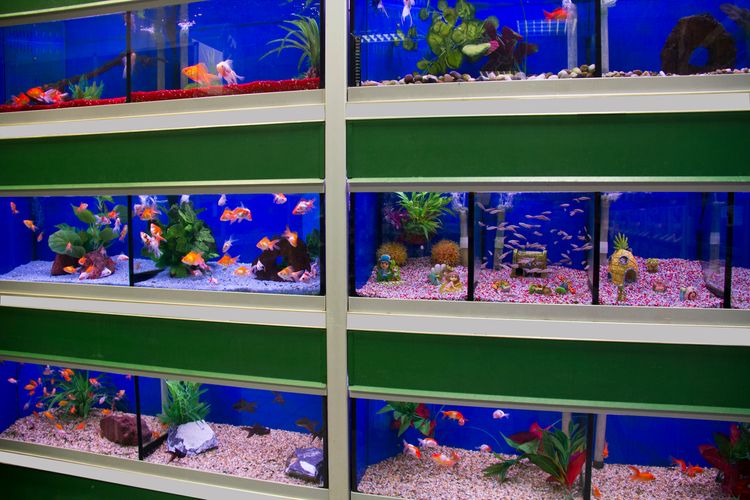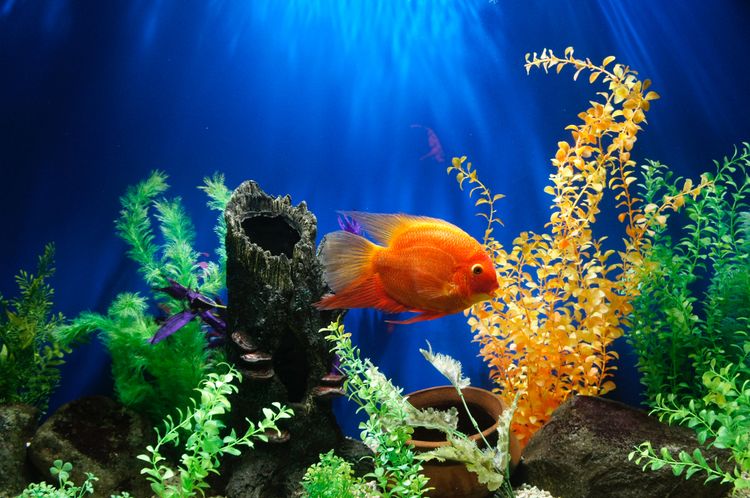Should You Stop Doing Water Changes?! - A Father Fish Video Review

About 7 or 8 months ago I stumbled on the YouTube channel of Father Fish, run by a fish enthusiast with over 7 decades experience in the hobby. Up until its permanent closing near the end of 2020, he also owned and ran Father Fish Aquarium, an aquatic pet store located in Venice, Florida.
Father Fish’s approach to fish keeping is heavily influenced by natural processes. By learning to work with nature, he seems to strive to produce and maintain the healthiest natural ecosystem for his wet pets rather than a fish tank that’s just nice to look at. I had been searching content related to low maintenance aquariums, and many of his videos provide his thoughts and methods of letting nature do what it does best.
His most popular video to date is titled "WHEN SHOULD I CHANGE MY AQUARIUM WATER? | CHANGING AQUARIUM WATER EXPLAINED." Posted March 3, 2023, it’s received nearly 119K views as of April 15, 2023. No doubt that water changes are an extremely poplar topic of discussion (and contention) on popular internet forums like YouTube and Reddit. Viewers are most likely lured to click this video due to the thumbnail exclaiming “STOP changing your WATER!” The content that follows is a rather compelling lecture delivered in typical Father Fish style.
Video Summary
“There is madness in the fish keeping hobby, and changing water all the time is one very distinct aspect of that madness.”
In the video, Father Fish describes aquarium water as a living environment that develops and matures over time, becoming more capable of supporting life. He draws a distinction between how we talk about water, what is IN the water versus what water IS. He says that changing water in a fish tank can be counterproductive, as it may remove beneficial compounds and disrupt the balance. “Old” water contains a variety of compounds, minerals, and organics that he says create stability, harmony, and healthfulness for the aquarium's inhabitants. He also makes the claim that water retains electromagnetic impulses from living matter, resulting in a harmonious relationship between the water and its inhabitants.
Impressions and Thoughts
Having watched a good amount of the early videos on Father Fish’s channel, this video represents an increasing quality of production. The title intro, graphics, background music, and b-roll are all pretty engaging and fit the content well. Father Fish’s delivery is structured as a lecture. He demonstrates an obvious confidence, understanding, and deep experience with what he is talking about. The speaking audio is clear throughout, and Father Fish has a certain charisma and charm about him that kept me engaged with a 10 minute video about…water! He makes his arguments and claims in a way that is actually quite artful, outright challenging what most in the hobby today assume as gospel but without being aggressive about it. He sounds reasonable and convincing, and his 70+ years in the hobby is certainly nothing that can be dismissed out of hand.
Who Should Watch This Video?
This video would certainly appeal to hobbyists interested in exploring how water is a dynamic component of the aquarium ecosystem, rather than just the clear wet stuff your fish swim in, or folks frustrated with performing intensive ongoing maintenance that they’ve been led to believe is an absolute must. I can also see how some might simply and rather selectively glean the whole “I don’t have to do water changes anymore!” mantra after watching this video. But to do so I think would be a huge mistake and really miss the point of what I think Father Fish is trying to make across all his posted content. That is to deepen your understanding and engagement with the fundamental natural processes that make this hobby even possible, and providing the healthiest environment possible for your fish.
Deeper Dive
One of the more thought-provoking notions for me was the concept that water retains electromagnetic impulses from living matter. It’s fascinating to think that the organisms and processes in a fish tank can fundamentally alter the very nature of the water it’s holding. However, I am skeptical that this is actually the case.
Considering Father Fish’s own description at the start of the video of how we describe water (what water IS versus what is IN the water), perhaps he is making this very mistake. We know that water conducts electricity and magnetic forces, that some aquatic organisms do produce and emit their own electromagnetic signals, and that many organisms have developed sensitivities to electro- and magnetic-impulses and fields. But do the organisms commonly kept in home aquariums have this ability, and does it fundamentally alter the very properties of water?
The claim that water retains electromagnetic impulses from living matter, leading to a harmonious relationship between the water and its inhabitants, is an intriguing concept. Some casual internet sleuthing leads me to believe that these 2 concepts just aren’t factual, at least as far as what’s been scientifically explored to date. While there are studies on the effects of electromagnetic fields on aquatic organisms and the potential impact of electromagnetic pollution on wildlife, these studies do not specifically address the claim that water itself retains these impulses.
As Father Fish explains, water is a polar molecule and has some unique properties due to its molecular structure, such as its ability to dissolve many substances and form hydrogen bonds. However, these properties do not directly relate to the retention of electromagnetic impulses from living organisms. In other words, it seems to me that electromagnetic impulses are something that may be IN water, but it’s not something that readily changes what water actually IS.
As far as the actual source of any electromagnetic fields are concerned, most aquatic organisms and fish do not generate their own electromagnetic impulses. While electric fish (think electric eels, electric rays, and weakly electric fish) are known for their ability to generate and emit electromagnetic fields, they represent a small fraction of the vast diversity of aquatic life. It seems like the majority of fish and other aquatic organisms do not possess specialized electrogenic organs or the ability to generate their own electromagnetic signals.
There ARE certain bacteria that can generate weak electrical currents as a byproduct of their metabolic processes. These bacteria are known as electrogenic or exoelectrogenic bacteria. They can transfer electrons to external electron acceptors, such as solid surfaces or electrodes, during their respiration process. This electron transfer creates a flow of electrical current.
It is important to note that the electrical currents generated by these bacteria are typically weak and may not have significant effects on the overall health or behavior of the aquarium inhabitants
Electrogenic bacteria can be found in various natural environments, including freshwater and marine habitats, as well as in aquariums. These bacteria can form biofilms on surfaces and may contribute to the development of natural electrical fields in their environment. In the context of a freshwater aquarium, these electrogenic bacteria might be part of the normal microbial community. They may play a role in bioremediation, breaking down organic waste and pollutants in the water. Additionally, their ability to generate electrical currents has inspired the development of microbial fuel cells (MFCs), a technology that uses electrogenic bacteria to convert organic waste into electricity.
However, it is important to note that the electrical currents generated by these bacteria are typically weak. I couldn't find any study or publication that shows that they may have significant effects on the overall health or behavior of the aquarium inhabitants.
Knowing this, my guess would be that any electromagnetic fields that may be detectable in a home aquarium are most likely produced by the human environment: the filters and heaters you have plugged in, your homes electrical wiring, the Wi-Fi you’re using to watch and post fish videos, your cell phone. And while some of the fish in your aquarium may have evolved to have sensitivities to such fields, they themselves likely aren’t generating any sort of measurable electromagnetic impulses, nor is the water itself retaining any electric signatures or properties. Turn off your submerged electric heater, and the electromagnetic field goes away.
Father Fish’s assertions about the aging and maturation of aquarium water as a desirable and even critical process to establishing a healthy balanced environment seem spot on. Aquarium water, as a living environment, develops and matures over time, becoming more capable of supporting life. This maturation process involves the growth and development of various microorganisms, such as beneficial bacteria, that contribute to the overall health and stability of the aquarium ecosystem. Nitrifying bacteria, such as Nitrosomonas and Nitrobacter, play a vital role in the nitrogen cycle by converting toxic ammonia and nitrite into less harmful nitrate.
Over time, aquarium water accumulates various compounds, minerals, and organics that contribute to the stability and health of its inhabitants. Some common beneficial components include trace elements and nutrients. Trace elements, such as calcium, magnesium, and potassium, are essential for the proper functioning of fish, plants, and beneficial bacteria within the aquarium. Nutrients, including nitrate, phosphate, and dissolved organic carbon, support the growth of microorganisms and plants in the aquarium, which in turn provide food and shelter for the fish.
By allowing water to age and develop a stable and diverse community of microorganisms and essential elements, it becomes better suited to support the overall health and well-being of the aquarium ecosystem. To quote Father Fish himself on the topic of performing regular water changes:
“Now why do we want to get rid of beneficial stuff that’s in the water? Well, we don’t!”
How This Video Has Changed Me
This video has definitely influenced how I think about fish keeping. In the future I’ll probably spend way less time (and money) with aquarium technologies and instead favor utilizing more natural methods to maintain water quality. I’ll definitely avoid doing 25% weekly water changes “just because”, opting instead for top offs to replace evaporation.
A water change will remain a tool in situations where it’s necessary. Times like reestablishing a disrupted aquarium, dealing with unexpected spikes in ammonia and nitrites, or after medicating the tank. While it is important to maintain the balance of the aquarium ecosystem, there are situations when water changes are necessary to ensure the health and well-being of its inhabitants.
Perhaps my biggest takeaway though, will be my relationship with aquarium water as something that should be patiently tended to and allowed to grow and mature, rather than just as the stuff you need to dump into a glass box for your fish.
References and Further Reading
Here are some related sources of info that I referenced or that you may find interesting. Some are books that you might find at a library, academic publications you might be able to access with a subscription, or freely available weblinks. While I do my best to track down reliable sources, I'm human and make mistakes. I can't verify or guarantee the accuracy, completeness, or contemporary relevance of any of the content listed below or personally endorse them. Do your research and draw your own conclusions.
- Balmori, A. (2015). Anthropogenic radiofrequency electromagnetic fields as an emerging threat to wildlife orientation. Science of the Total Environment, 518-519, 58-60.
- Budelli, R, and A A Caputi. “The electric image in weakly electric fish: perception of objects of complex impedance.” The Journal of experimental biology vol. 203,Pt 3 (2000): 481-92. doi:10.1242/jeb.203.3.481
- Bullock, T. H., (2005). Electroreception. New York: Springer.
- Fisher, Cameron, and Michael Slater. “Electromagnetic Field Study - Effects of Electromagnetic Fields on Marine Species: A Literature Review.” Tethys - Pacific Northwest National Laboratory, Oregon Wave Energy Trust, Sept. 2010.
- Hopkins, C. D. (1999). Design features for electric communication. Journal of Experimental Biology, 202(23), 1217-1228.
- Logan, B. E. (2009). Exoelectrogenic bacteria that power microbial fuel cells. Nature Reviews Microbiology, 7(5), 375-381.
- Lovley, D. R. (2012). Electromicrobiology. Annual Review of Microbiology, 66, 391-409.
- Noga, E. J. (2000). Fish Disease: Diagnosis and Treatment. Iowa State University Press.
- Spotte, S. (1992). Captive Seawater Fishes: Science and Technology. Wiley-Interscience.


Comments ()